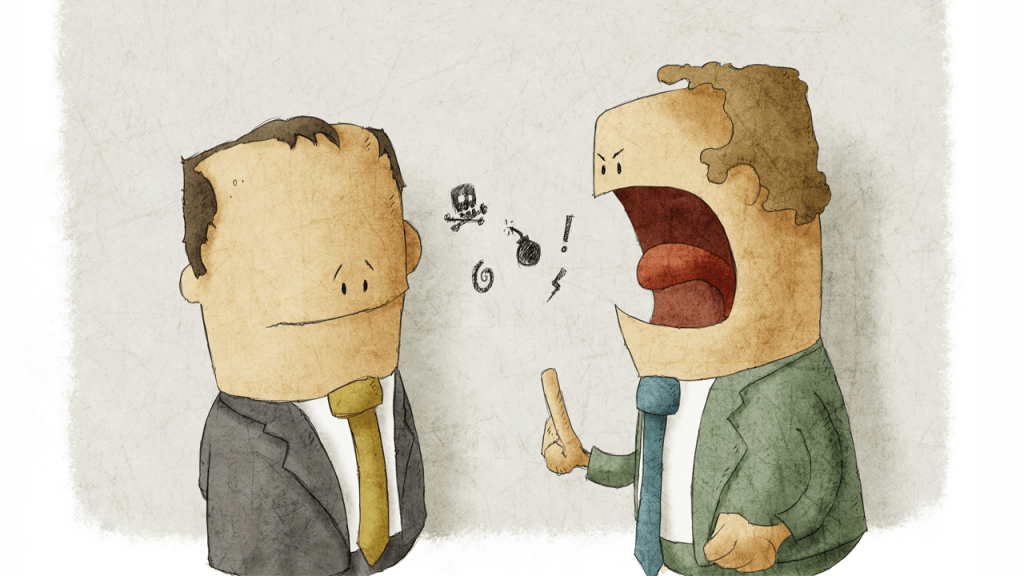I can recall one of the worst coworkers I ever had the pleasure of dealing with.
His name was Sam, and he stunk.
No, I mean literally.
He didn’t wear deodorant.
Not sure if he ever showered.
His breath stunk.
He got right up in your face when he talked to you––and talked to you he did, in the most abrasive way possible.
It’s like he had no understanding of normal human interactions.
He would brag incessantly.
He would immediately declare your ideas as inferior to his.
He would say “indeed” far too often and used $5 words to make himself sound more educated than you, because he believed he was.
At first I thought I would have to quit my job, because I just couldn’t deal with him and he was constantly in my face.
But then I realized a few things about old Sam.
Despite all his faults, underneath it all, he was actually a pretty nice guy.
Not only that, he was actually quite intelligent.
He was very critical, but at least he was honest.
While other people would shine you on, Sam would give you the truth, whether you liked it or not.
His lack of tact could be a good thing, if you developed some thick skin and knew how to handle it.
So, I decided to change my approach.
Instead of trying to change Sam, I accepted him.
I actually praised and acknowledged him for his strengths, which few people had done in the past.
He responded with a loyalty you couldn’t even imagine.
Even though Sam still wasn’t someone I would necessarily call a friend, he was not only a coworker I could deal with, but one who actually acted as an ally, by helping support my ideas.
In your job as software developer, you’ll encounter plenty of your own Sams.
You’ll also encounter plenty of friendly people who you naturally get along with.
You may even encounter the toxic person who, no matter what you do, will always spell trouble, and who you should generally avoid as much as possible.
It’s important to know how to deal with all of these kinds of coworkers because, by definition, you’ll be working with them almost every day.
You can be the best programmer in the world, but if you can’t figure out how to get along with your coworkers, you are not only going to have a miserable time at work, you probably won’t be all that productive either.
This chapter is all about learning how to deal with coworkers––both the difficult and the easy ones.
First Impressions Count

It’s really difficult to change the way people perceive you after you’ve met them, so when dealing with people who will likely make up a relatively large portion of your life, it’s probably a good idea to make a good first impression.
Now, I realize that for you it may already be too late.
But you can always make a good first impression for your next job. Or you can try and remake your first impression at an existing job by doing a complete 180 and resetting people’s impressions of you. (Difficult, but not impossible.)
When you first come into a new work environment, you want to make sure that you don’t come off as inferior or not qualified for the job.
Being confident in your skills is really important, because many times what your coworkers think of you will inform the decision your manager makes regarding your career advancement.
So, even though humility is a virtue, don’t be timid and acquiescent just because you are the new guy or gal.
You don’t want to be forever labeled and thought of as the new guy.
We all know coworkers who have worked at the same job for several years and are still thought of as the new guy, because that was everyone’s first impression of them and it stuck.
But don’t be cocky and arrogant either.
Instead, aim for a mix of confidence and curiosity.
You know what you are capable of and are secure in your abilities, but you are at a new job and respect the experience of your coworkers who have been there longer.
One of the best ways to pull this off is to ask plenty of intelligent questions––especially if someone is training you.
You also want to be especially careful about how you dress and behave on your first few days on the job.
Just because you can dress casually, doesn’t mean you should.
Dress one or two notches higher than what you would normally wear in that work environment for your first week, so that you give off a more professional impression.
Also make sure you are a bit more outgoing and friendly.
Say “hello” to everyone you meet, and try to use their first names when you greet them.
Doing all of these things will help you create a good first impression which will go a long way in starting off on the right foot with your coworkers.
Be As Helpful As Possible
One thing that has always served me well in my career and ensured that I made plenty of allies wherever I worked was my willingness to help my fellow employees.
Your attitude at work should not be combative or competitive–although there is nothing wrong with a little healthy competition at times––but helpful and supportive instead.
You really don’t want to get into situations where your coworkers are trying to bring you down or make you look bad all the time.
Some people are going to do that no matter what you do––we’ll address that in a bit––but, for the most part, if you are seen as a helpful person, people will respond in kind.
Bring helpful and being willing to help coworkers with their problems will also benefit you, because you’ll look much smarter than you are.
You’ll gain a reputation for being a “go to” person on your team, which will help you greatly if you are ever trying to get a team lead position or promotion.
Overall though, being helpful is just a good idea in general. It disarms combative coworkers, nets you more overall experience, and generally makes people see you in a positive light, which leads to less overall problems and a better work environment.
Avoid Drama
Even if you make a great first impression and you are the most helpful person on your team, you are likely going to face some drama at the workplace.
Where there are humans, there is drama.
It simply is a consequence of social environments.
But just because there is drama, doesn’t mean you have to get all caught up in it.
Do not allow bullshit into your life.
If you have drama, you have allowed bullshit in. It’s as simple as that.
Really, it is.
You are in control of what you allow into your life and what you choose to invest your emotional and physical energy in.
When someone comes your way looking to start some drama, all you have to do is not encourage or acknowledge it.
Don’t get caught up in the gossip.
When someone talks behind someone else’s back, just reply by saying something nice about that person.
When a rumor is going around, don’t even listen to it––certainly don’t spread it.
Just do your job and change the subject to something work-related.
When you hear the conversation of the room buzzing with the pre-drama buzz, it’s a great time to throw on those headphones and start typing away.
This is especially true when coworkers are trying to create drama around or about you.
So, someone doesn’t like you and they’ve said something nasty about you?
Big deal. Ignore it. Move on.
Drama doesn’t add anything positive to your life. Getting involved in drama has ended many programming careers, just because an otherwise smart software developer couldn’t mind their own business and stay out of it.
But Don’t Avoid Conflict

Drama is unnecessary, but conflict isn’t.
Wherever there are people working together to achieve a goal, there will be some form of conflict.
I think this, you think that, you think I am stupid, I think you are a moron, therefore we have conflict.
Some amount of conflict is healthy. It’s healthy in any kind of relationship.
People don’t always agree.
They have differing points of view, different world views, etc.
Conflict, if resolved properly, is beneficial, because it should result in a better results than either you or I could produce with our own limited thinking.
If you disagree with someone’s suggestion, be tactful, but state your opinion.
Conflict can become drama, but it doesn’t have to as long as it is resolved properly.
Try to keep your cool and don’t get upset.
Conflict shouldn’t become personal.
If it does, you might need to cool off and leave the situation until you can re-engage with your coworker in a peaceful, constructive way.
Your goal should be to find the best solution to the problem, not to prove you are right or smarter than your coworker or that their idea is dumb.
You may also need to get into conflict if a coworker is violating your personal boundaries.
Read the book “Boundaries” to get a good understanding of what constitutes reasonable personal boundaries, and how to deal with people who violate those boundaries.
In these cases, you can still engage in healthy conflict by letting your coworker know when something they are doing or saying to you is not ok.
This can be done in a friendly, but firm way that doesn’t attack the other person, but clearly defines what your personal boundary is.
Conflict isn’t fun, but if you avoid it, it can blow up into drama and repressed anger or resentment which will poison your relationships at work and at home.
With that said, you should always strive to avoid arguments.
Conflict can be resolved without resorting to arguments, especially about subjects not related to work.
(We’ll get to two of those in a second.)
The difference between a healthy conflict being resolved and an argument is mainly intent.
If you are seeking to prove yourself right and your opponent wrong, it’s an argument.
If you are genuinely looking to find a place of mutual understanding and respect to resolve differing views as best you can, it’s a healthy resolution of conflict.
Dale Carnegie said it best when he said:
“I have come to the conclusion that there is only one way under high heaven to get the best of an argument—and that is to avoid it. Avoid it as you would avoid rattlesnakes and earthquakes.”
Politics And Religion
Speaking of arguments, let’s talk about politics and religion.
Oh and we could throw in a healthy dose of sex in there, too.
Or perhaps not.
Not at work. Just don’t do it.
If you want to find an argument and create animosity like you’ve never seen before, go ahead and bring up one of these topics.
People have extremely strong views on these subjects.
People are generally very narrowly-minded on these subjects.
People get very emotional about these subjects.
But, most importantly, these subjects don’t in any way help you get your job done or contribute to a strong working environment.
Even if you think a coworker is likely to agree with you on one of these subjects, it’s best not to talk about them, because one, they might not agree, and two, other coworkers, who don’t agree, are likely to overhear the conversation and get involved or silently seethe at their desks, just waiting for the opportunity to bring you down.
Trust me, nothing good can come of it.
You can also be branded as a troublemaker or rabble-rouser when word gets around that you are the source of the political unrest at the office.
I’ve seen many well-respected and intelligent programmers be escorted out of the building with a cardboard box, because they couldn’t keep their highly-charged opinions to themselves.
Save these conversations for the dinner table where they belong.
Coworkers Who Don’t Work
In just about every work environment there is that one guy or gal who seems to never actually get any work done.
They are a deadweight on the team and everyone knows it.
You are working hard at your desk, kicking ass and taking names, and they are just sitting there browsing the web and posting political messages on Facebook.
It can be infuriating.
You feel the urge to slap them and drag them into the boss's office stating plainly they are a slacked and should be fired.
Don’t do it.
In fact, don’t do anything.
This person has a rope, and they’ll eventually hang themselves, if you let them.
You worry about you.
Get your work done.
Be as productive as possible.
Don’t worry about what other people do or don’t do.
The best way you can deal with one of these kinds of people is to be so productive yourself that the contrast becomes so apparent that your boss can’t help but notice who the slacker is.
The worst thing you can do is tattle on them, which makes you look petty and gives them a chance to defend themselves.
For one thing, you could be wrong about your assessment and they could pull out a notebook documenting everything they’ve done every single day for the past year––now making you look like the slacker.
For another thing, they could be on the job because of some form of nepotism that you aren’t aware of.
You don’t want to go and report the CEO’s nephew to your boss, because guess who’s going to win that conflict and guess who is going to get fired?
Instead, just shut up and do your own work as best as you can.
These issues have a way of resolving themselves, given enough time.
If you do want to do anything, offer to help this person.
That’s right.
Reach out and ask if they need some help.
See if you can inspire them with your work ethic.
See if you can motivate them and get them to care about doing a good job.
You’d be surprised what a little encouragement can do.
Coworkers Who Talk Too Much
Here is another situation many of us face.
You want to get your work done.
You want to be polite and social.
But, there is just this one dude, who’s really friendly, but he just won’t shut up.
You sit down to do your work and there he is popping his head over the cubicle wall wanting to talk about who you think will win the election.
You come back from work and there he is again, in your cubicle waiting for you so he can discuss the newest developments in his ongoing feud with his neighbor.
You are even giving him all the signals that you are busy and that he should go on and go back to work.
You repeatedly look at your watch.
You reach for your headphones.
You even swivel your chair to face your monitor and put your hands on the keyboard, but he just doesn’t shut up.
So what do you do?
There are quite a few ways to handle this situation, but one easy way that has the advantage of cutting out quite a few potential distractions is to set aside a focus time and make clear rules around it.
I’ve used the Pomodoro™ technique myself for working in a focused manner.
In fact, as I’m writing this very chapter, there is a 25 minute timer ticking down, during which I am 100 percent focused on writing this book and am not tolerating any distractions at all.
You don’t necessarily have to use the Pomodoro™ technique.
What is important is that you have some way to designate focused time when you don’t want to be interrupted.
In the past, I’ve done something as simple as creating a little hanging sign that on one side says “feel free to interrupt,” and the other side says “focusing, please don’t interrupt.”
I simply explained to my boss and coworkers that I read a study showing that context switching caused by interruptions causes a huge loss in productivity, so I am trying an experiment to increase my productivity.
Then I explained to them the sign and said I knew it was silly, but would they please humor my attempts to be more productive.
No one argued or had any problems with it.
And it worked like a charm.
Mr. Talk-too-much got the hint and I didn’t even have to confront him.
My productivity actually did skyrocket, since I wasn’t being interrupted all the time.
So, I highly recommend doing something similar, not just to solve this one problem, but to increase your overall productivity.
Multitasking and interruptions really do cause huge productivity hits.
Alas, if this technique doesn’t work, or you refuse to try it, the next thing I’d recommend is pretty obvious, but it takes some courage.
Remember how I said not to avoid conflicts?
This is one of those times.
Simply confront Mr. Talk-a-lot and tell him that you are there to work and that you’d appreciate it if he didn’t talk about non-work related stuff at work.
Tell him you are weird and you know this is a strange request, but that you just have a difficult time working when you are distracted and you are easily distracted.
Make it seem like a defect you have. Not that he’s an ignorant ass who talks too much and doesn’t work enough and can’t take any hints.
Toxic People

I really can’t end this chapter without talking about the kind of coworkers who are the worst, no make that, are impossible to deal with.
I call them toxic people.
Some people you can’t help no matter what, and you should just avoid them all together.
Some people just seem to always have bad things happen to them, carry around five suitcases full of baggage and drama, and always seem to be the helpless victim who just can’t catch a break.
You can identify these people by the string of dead bodies they leave behind.
They have bad attitudes, can’t be reasoned with, and just do everything they can to make their lives and the lives of the people around them a living hell.
They can’t get along with their coworkers.
They can’t get along with their families.
Even their own dog thinks they are an asshole.
The danger of these kinds of people is that you feel bad for them and you want to help them.
It seems like they just are really unlucky and that they’ve been dealt a crap hand.
But whether fate has any part or not in their predicament, it’s not up to you to decide.
It’s best that you just avoid them altogether.
If you have to interact with them, keep your interactions as brief as possible.
If you can avoid them completely, do it.
If you are on a team with one of these people and you constantly have to interact with them, actually consider switching teams or even switching jobs.
I know this seems somewhat extreme, but trust me on this one, like Morpheus told Neo in the Matrix to do when he saw an agent: RUN.
What About X?
I realize this short chapter in dealing with coworkers is not enough to cover all situations.
I’ve tried to outline the most common situations and pragmatic general advice, but arguably a whole book could be written on the subject.
Rather than write one, I’ll refer you to what I think is the quintessential book on dealing with people––which I’ll do many times throughout this book––How to Win Friends and Influence People by Dale Carnegie.
Speaking of dealing with people?
How about your boss?
Don’t worry, we’ll cover that tricky topic next.

